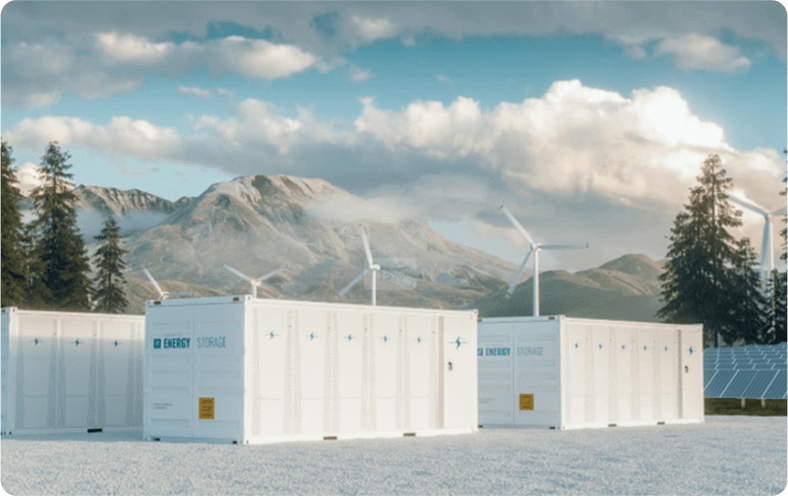Nov. 25, 2025
Next-Generation MWh-Scale Energy Storage Systems for Industrial, Utility, and Microgrid Applications
As the proportion of renewable energy generation continues to rise, commercial and industrial (C&I) users alongside grid operators are demonstrating a rapidly increasing demand for understanding energy storage capacity and long-duration storage technologies. When specifying energy storage system parameters for large scale battery storage projects, MWh (megawatt-hour) has become the industry-standard unit for measuring the total energy output capacity of such systems. This technical paper comprehensively analyzes the principles and value of MWh-scale energy storage systems (Megawatt-hour BESS) from perspectives including engineering, system architecture, and project application scenarios.

I. Defining Power (MW) vs. Energy (MWh)
A megawatt (MW) is a unit of power, equal to 1,000 kW or 1,000,000 W. MW is used to describe instantaneous output for:
Utility-scale solar power plants and wind farms.
Large battery storage systems (BESS) designed for grid stability.
Hybrid renewable microgrids.
1. How Many Kilowatts Are in One Megawatt?
1MW = 1000kW. While kW typically applies to household or residential loads, MW is the standard metric for commercial, industrial, and utility applications.
2. Scaling Up: GWh vs. MWh
1GWh = 1000MWh = 1,000,000kWh. Gigawatt-hours (GWh) are generally reserved for describing national energy capacity or giga factory-scale battery manufacturing output. For example, SolarEast BESS's global manufacturing output exceeds 22 GWh annually, supporting OEM, ODM, and project-based custom production.
3. The Significance of 1MWh
1MWh refers to the electrical energy stored or discharged over a period of time. To put this in perspective:
Household Equivalence: Considering a typical U.S. household consumes about 30kWh per day, 1MWh can provide enough power for approximately 33 households per day.
Solar Land Footprint: A typical 1MW solar farm requires 4–5 acres approx 16,000–20,000m²of land. 1MWh of storage is often paired with this size of PV system.
II. Integrated Solutions: From Cabinet to Container
For C&I and utility customers, the flexibility to scale storage capacity from kWh to multi-MWh is paramount.
1. Application of C&I Battery Storage (kWh Scale)
For factories, hotels, shopping malls, and telecom applications, SolarEast BESS Energy supplies various smaller systems:
60kW / 120kWh battery systems.
These systems are key for peak shaving, bill optimization, UPS-grade backup, and solar-plus-storage integration.
2. Achieving Large Scale Storage with Containerized Solutions
To effectively store 1MWh of electricity or more, the industry relies on containerised battery storage systems. For instance, our 125kW / 215kWh High-Voltage ESS Cabinets can support up to 10 units in parallel, easily scaling from 215 kWh up to multi-MWh deployments.
However, true utility and large scale battery storage is achieved using pre-integrated containers, such as our container battery storage 1MWh solution. These larger systems are suitable for:
Factories, logistics centers, data facilities, mining, and microgrids.
Applications including peak shaving & demand charge reduction, backup power, load shifting, and renewable energy smoothing.
III. Partnering with a Specialized Container BESS Supplier
Understanding MW and MWh allows enterprise customers to size their projects correctly, leading to optimized ROI. This requires partnering with experienced manufacturers.
1. SolarEast BESS: Your Containerized Battery Energy Storage System Supplier
As a global industrial-grade ESS manufacturer, SolarEast BESS provides essential large battery storage systems and services:
Product Portfolio: Ranging from 250–500kWh commercial ESS cabinets to 1–5MWh HV ESS containerised battery storage solutions.
Manufacturing Excellence: Our container energy storage system factory boasts 150,000m² of automated production space, supported by 25+ R&D specialists and an annual capacity exceeding 22 GWh. This capability ensures engineering-grade reliability for every system sold.
Customization Services: We offer OEM/ODM/OBM services, factory-direct manufacturing, cross-border delivery, and on-site commissioning to global partners.
Whether your project requires a single container battery storage 1MWh unit or a multi-MWh facility, SolarEast BESS, as a premier containerized battery energy storage system supplier, delivers the necessary scalability and robust performance required for mission-critical energy projects.
Related Products
Related Solutions
Hotel & Guesthouse Battery Storage Solutions
+ -SolarEast BESS provides hotels and inns with efficient, safe, and smart energy storage equipment designed to slash operational costs and meet carbon emission regulations. Our all-in-one hybrid energy storage systems seamlessly integrate with your existing solar energy storage system, leveraging advanced high voltage energy storage technology to ensure a stable 24-hour power supply.
Utility Scale Energy Storage Solutions
+ -Optimize Energy Efficiency. Cut Costs. Embrace Sustainability. SolarEast Battery Energy Storage Systems provides customized BESS solutions for industrial parks, farm energy storage solutions, and C&I Energy Storage System to reduce peak demand charges, stabilize power supply, and enable smart energy management. Our industrial and commercial energy storage systems cover a full range of products from 30kWh to 5MWh, including small integrated energy storage devices and large customized energy storage solutions, which are widely used in microgrids, off-grid power supply, peak cutting and valley filling, demand side management and backup power.
Energy Storage Solutions for Industrial Parks
+ -As a leader in electrical energy storage systems, SolarEast BESS delivers turnkey solutions—from site analysis and system design to installation and long-term O&M. Our lithium battery energy storage technology ensures high cycle life and maximum safety, providing a reliable foundation for the next generation of eco-industrial parks.
Commercial & Industrial Storage System Solutions
+ -SolarEast BESS is a supplier of lithium iron phosphate batteries, microgrid energy, large-scale battery storage, grid-scale energy storage, high-voltage energy storage batteries, and energy storage solutions. SolarEast solar batteries and solutions are recognized and welcomed by customers worldwide. Our targets are focused on the following markets: industrial and commercial energy storage systems, Telecom Energy Storage Systems (TESS), transportation/utility energy storage, and large/medium/small backup power systems.
Residential Energy Storage System Solutions
+ -SolarEast's residential energy storage system, designed for homes, villas, sunrooms, and communities, stores solar energy to reduce power bills and ensure reliable day-and-night energy use.
Energy Storage Solutions for Farm & Island
+ -Whether you are looking for a reliable solar battery energy storage system for sale or a robust hybrid power network, SolarEast BESS transforms unstable grids into resilient, smart energy hubs for rural and coastal communities.


